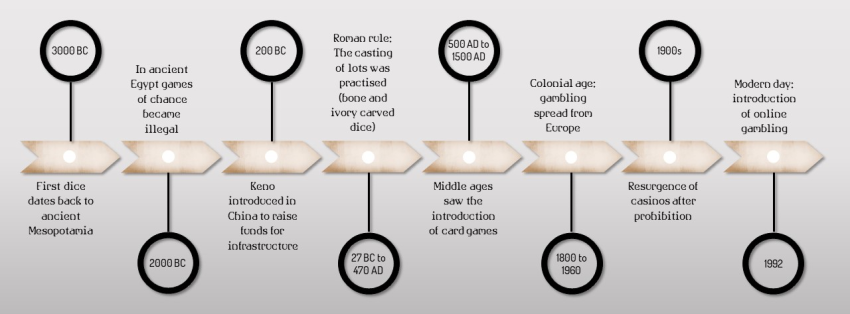The evolution of gambling is a fascinating journey that spans thousands of years, revealing how this ancient pastime has transformed into a significant aspect of modern entertainment and economy. From its earliest origins in ancient civilizations with rudimentary dice games, gambling has adapted alongside human society, developing into complex betting systems and thriving online casinos. As we delve into the history of gambling, it’s essential to recognize the pivotal moments that shaped its legality and acceptance, from state lotteries to the emergence of contemporary gambling practices. In today’s world, responsible gambling has become a crucial topic, especially with the rise of online platforms that enhance accessibility but also raise concerns about gambling addiction. Understanding this evolution is vital for navigating the intricate landscape of gambling, promoting awareness, and ensuring a safer gaming environment for all.
The journey of betting and wagering is one marked by cultural shifts and technological advancements. Known for its thrilling potential and inherent risks, this age-old practice has traversed from ancient dice games to the sophisticated realm of digital gambling. Engaging in games of chance has morphed into a major global industry, often sparking discussions on responsible habits and player protection. Today, online betting platforms offer an expansive range of options, inviting players to test their fortune from the comfort of their homes. As we reflect on the transitional nature of this avid pastime, recognizing the need for gambling addiction awareness becomes increasingly vital in fostering a more responsible gaming culture.
The Evolution of Gambling: Historical Milestones
The journey of gambling spans millennia, revealing a fascinating timeline of human behavior and cultural adaptability. Dating back to ancient civilizations, such as the Chinese, Greeks, and Romans, gambling has consistently woven itself into the fabric of society. Artifacts from around 2300 BC, including dice, reflect the early playful nature of gambling, where chance played a central role in people’s lives. The significant shift began around 1569, when Queen Elizabeth I introduced England’s first state lottery, embedding gambling deeper into societal norms by using it as a mechanism for public funding.
From these early beginnings, gambling evolved significantly, transforming not only recreationally but also economically and politically. The development of organized betting on gladiator matches in Rome laid the groundwork for modern sports betting, while the establishment of state lotteries served as a model for future gambling legislation worldwide. This historical progression showcases the changing perceptions of gambling over time, from a simple diversion to an accepted method of generating revenue and excitement in society.
Frequently Asked Questions
What are some key milestones in the evolution of gambling throughout history?
The evolution of gambling is marked by significant milestones, starting from ancient civilizations that engaged in dice games around 2300 BC. Notable moments include the establishment of the first state lottery by Queen Elizabeth I in 1569, which legitimized organized gambling and offered public funding. The 20th century saw the rise of casinos in Las Vegas and Atlantic City, which played a crucial role in making gambling mainstream. Today, the online gambling boom represents a transformative phase, offering unprecedented access to various games and betting options.
How has responsible gambling evolved in the context of modern gambling practices?
As the gambling landscape has evolved, so has the emphasis on responsible gambling. Initially focused on traditional betting, modern gambling practices incorporate mechanisms to address gambling addiction awareness and promote player safety. Online casinos now often implement features allowing players to set limits on their spending and time. Moreover, organizations like Gamblers Anonymous advocate for support systems, reflecting a broader commitment to responsible gambling and strategies aimed at preventing addiction in a rapidly expanding industry.
| Key Points |
|---|
| Gambling has a history that dates back to approximately 2300 BC with dice games. |
| Ancient civilizations like the Chinese, Greeks, and Romans engaged in early gambling forms. |
| Queen Elizabeth I established the first state lottery in 1569, marking a key point for organized gambling. |
| The 20th century saw the rise of casinos, transforming gambling into a multi-billion dollar industry. |
| The 21st century has revolutionized gambling through online casinos that break geographical barriers. |
| Responsible gambling practices are essential to combat addiction and protect players in modern gambling. |
Summary
The Evolution of Gambling tells the story of how this ancient practice has transformed over millennia, reflecting its deep-rooted affiliation with human culture. From rudimentary dice games in ancient civilizations to the lavish casinos of the 20th century, and now the booming online gambling scene of the 21st century, each phase signifies a shift in societal acceptance and technological advancement. Yet, alongside this growth comes a significant responsibility, as modern gambling poses new challenges, particularly concerning addiction. The commitment to responsible gambling initiatives is more essential than ever, ensuring both player protection and the sustainable growth of the industry. As we continue to witness the evolution of gambling, we must appreciate its history and approach the future with mindfulness and care.
